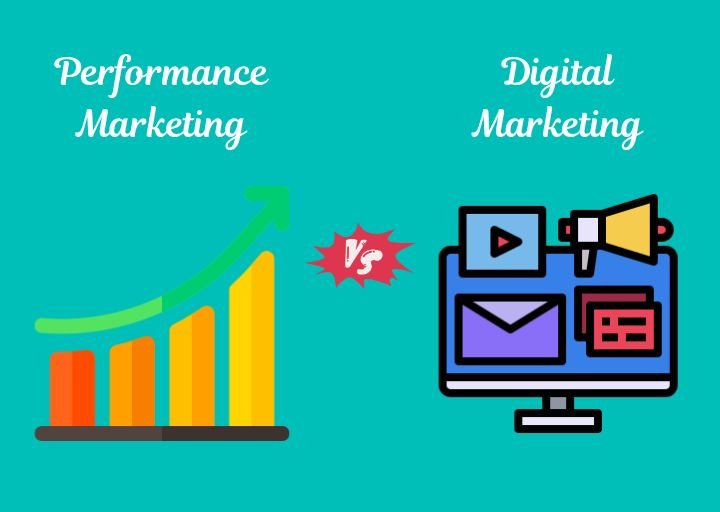What’s the Best Way to Grow Your Business?
Marketing teams invest significant amounts of money trying to determine the best strategy for business growth. There are numerous approaches to this challenge, ranging from PPC advertising to content and video creation. So how should you allocate your marketing budget effectively?
Performance marketing and digital marketing are two major approaches to consider. But what exactly differentiates performance marketing from digital marketing? And once you understand these differences, how do you choose which approach to adopt? Let’s delve into it.
What is Performance Marketing?
Performance marketing focuses on optimizing your team’s return on investment (ROI). This approach includes strategies such as pay-per-click (PPC) ads, cost-per-thousand (CPM) ads, and cost-per-action (CPA) ads. In these cases, you’re paying for specific, measurable results.
Performance marketing is particularly attractive to brands with limited budgets because it provides clear, quantifiable outcomes. For instance, if you invest $100 in a PPC campaign at $1 per click, you can expect 100 clicks from that campaign.
However, performance marketing has its drawbacks. Despite the ability to use data to refine your efforts, initial performance marketing strategies can be broad and imprecise. Additionally, there’s no guarantee that the leads generated will convert into paying customers in the future.
Importance of Performance Marketing
Performance marketing is crucial for quickly generating new leads, especially if your budget is tight. It allows you to directly measure the results of your campaigns and pay to increase visibility for your business, which can be an effective way to boost brand recognition.
For brands with stringent marketing budgets, performance marketing offers a low-risk advertising option. The predictability of results from performance marketing campaigns can be reassuring for companies trying to manage their marketing spend.
Performance Marketing Strategies
Effective performance marketing relies on targeted strategies to achieve measurable results. Here are three essential performance marketing channels to consider:
- Search Engine Marketing (SEM): Utilizing paid ads on search engines to attract relevant traffic and generate leads through PPC.
- Social Media Marketing (SMM): Leveraging paid social media ads to target and engage audiences based on detailed demographic and interest data.
- Connected TV (CTV) Advertising: Using CTV platforms to deliver targeted streaming ads to specific audiences, enhancing engagement and measurable results.
What is Digital Marketing?
Digital marketing encompasses any marketing efforts that occur online. It is a broad category that includes performance marketing, as well as other strategies such as growth marketing.
The essence of digital marketing lies in the focus on the platforms where you advertise, rather than the specific methods of advertising.
Importance of Digital Marketing
Digital marketing engages customers where they spend most of their time: online. By leveraging various channels, digital marketing can both generate new leads and nurture existing ones.
A successful digital marketing strategy often involves omnichannel customer engagement, allowing brands to maintain a consistent presence across multiple platforms. Companies that excel in omnichannel marketing retain an average of 89% of their customers.
Digital Marketing Strategies
A comprehensive digital marketing approach involves a range of strategies to effectively reach and engage your online audience. Examples include:
- Content Marketing: Creating and sharing valuable content to attract and retain an audience, thereby establishing brand authority and trust.
- Search Engine Optimization (SEO): Improving your website and content to rank higher in organic search results and drive more organic traffic.
- Email Marketing: Sending personalized emails to engage leads, build customer relationships, and promote your offerings.
- Influencer Marketing: Collaborating with influential individuals to leverage their credibility and reach to enhance your brand’s visibility.
- Affiliate Marketing: Partnering with affiliates who promote your products or services and earn a commission on the sales or leads they generate.
Essentially, digital marketing strategies can be diverse and inclusive of performance marketing approaches.
Digital Marketing vs Performance Marketing
Understanding both performance marketing and digital marketing reveals that these strategies are not directly competitive but complementary. Gaining insight into both approaches provides a comprehensive view of your marketing efforts, enhancing your overall strategy.
Similarities
While not all digital marketing qualifies as performance marketing, most performance marketing is inherently digital. The key similarity between these two strategies is that they both operate within digital environments, making them interconnected in their application.
Differences
The primary distinction between digital marketing and performance marketing lies in the specificity of their definitions. Performance marketing is a targeted approach emphasizing return on investment (ROI) and includes distinct metrics and KPIs to evaluate success. These metrics differ from those used in broader digital marketing.
Conversely, digital marketing encompasses a wide range of strategies aimed at creating a cohesive brand presence across various digital channels. It is less focused on ROI and more on building an overarching brand vision.
Combining Digital and Performance Marketing
Integrating digital marketing with performance marketing involves embedding performance strategies into your broader digital strategy. It’s essential to ask how performance marketing can enhance and support your overall digital marketing efforts.
How Performance TV Can Help
WEB CREATIONS TECHNOLOGIES Performance TV is a Connected TV (CTV) advertising solution that effectively combines digital and performance marketing. This approach allows you to target your ideal audience with tailored Connected TV ads on popular streaming services, adding a powerful channel to your omnichannel customer engagement strategy.
Performance TV also offers the advantages of performance-focused channels such as paid social media and display advertising. With detailed reporting and insights into key metrics, the CTV platform enables you to concentrate on performance while engaging your audience in a novel and compelling manner.
Final Thoughts
Digital marketing is a broad strategy centered on omnichannel customer engagement. While crucial, focusing solely on digital marketing might cause you to miss out on the benefits of performance marketing. To create a robust marketing plan that best supports your business, understanding and integrating both digital and performance marketing is essential.
WEB CREATIONS TECHNOLOGIES is here to assist. Request a demo to discover how performance-driven video marketing can contribute to your business growth.

